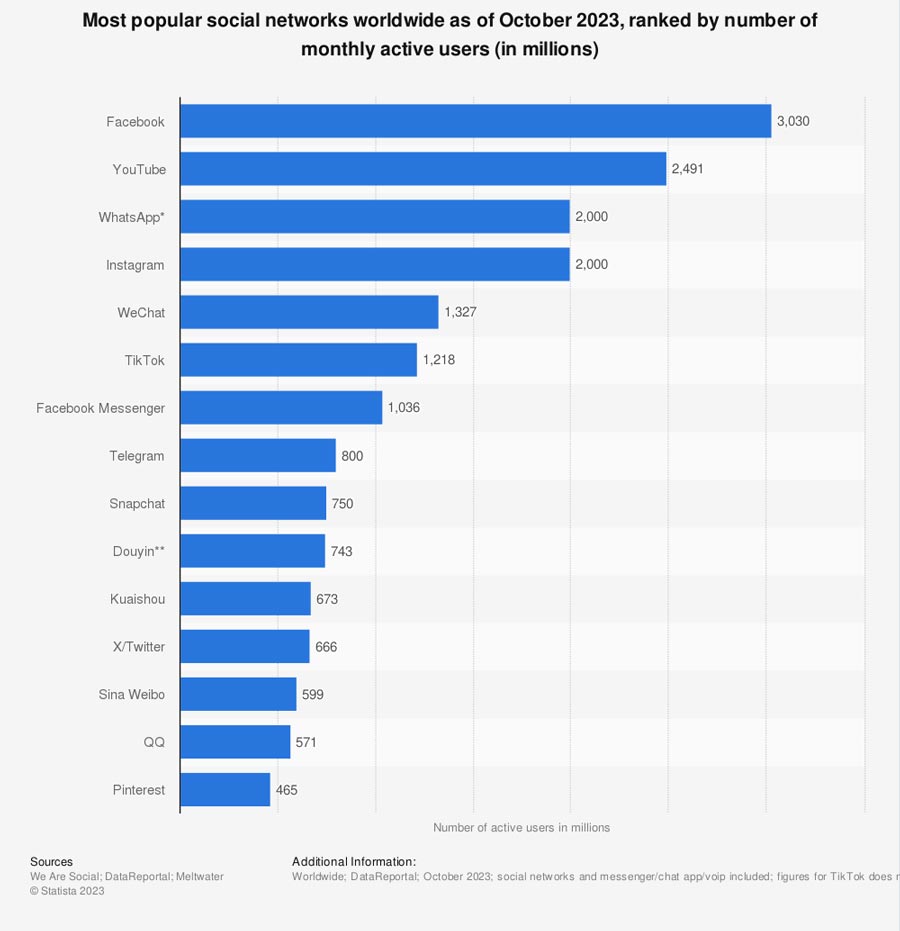
- Originally Published on December 5, 2023
39 Online Reputation Management Statistics to Know In 2024
The internet can be a blessing and a curse in many ways, including its effect on your reputation. A positive digital presence boosts your personal life, professional opportunities, and business success. However, recent reputation management statistics show that a negative online footprint can do just as much harm.
In 2023, a positive online reputation is not only a bonus but required. There are 5.3 billion internet users worldwide—over 65% of the global population. When these internet users research a business, 65% trust search engines the most.
At Minc Law, our online reputation management (ORM) services end online threats and boost reputations. We understand the outsized influence your online reputation plays on every aspect of your life. Our team has worked with thousands of clients to remove unwanted content and build a positive online presence.
This article lists the latest online reputation management statistics highlighting why an ORM strategy is crucial for individuals and businesses alike. Then, we list actionable tips for cultivating and maintaining a positive digital footprint.
The Importance of Your Online Reputation in the Digital Age
In 2023, your digital footprint impacts everything from personal relationships to self-confidence to business prospects. Search engines start almost 70% of all internet experiences, and more than 95% of consumers turn to the internet to learn more about brands.
Further, only 5% of Google searchers look past the first page, so your top-ranking results can shape your entire online reputation.
It can be intimidating to consider how much of an effect your online reputation has on your life. But this article is not meant to discourage or scare you. On the contrary, it is written to ensure that you are aware of the risks at play so you can take appropriate measures to protect yourself.
The Importance of a Positive Online Reputation For Businesses
Online reviews and star ratings can make or break a business in the digital world. In fact, 85% of internet users believe online reviews are as trustworthy as personal recommendations.
In this section, we discuss how both positive and negative reviews can affect your business’s reputation.
The Benefits of a Stellar Review Profile of Your Business
In today’s competitive business environment, good reviews are not only helpful but required. 75% of consumers use positive reviews to determine whether they trust a company or not, showing just how crucial cultivating a positive online business profile is for building a customer base.
In fact, some studies suggest that adding a star to your business’s Yelp rating can increase your revenue by up to 9%. Improving your online review profile can generate real improvements to your bottom line.
It is also important to respond well to both positive and negative reviews. Nearly half of consumers are more likely to visit businesses that respond to negative reviews. Handling negative reviews well shows potential customers that you value customer service.
For further reading, please see our resource explaining ‘Why a positive reputation is important in business‘.
The Consequences of a Negative Brand Reputation
As you may have noticed from watching the news or scrolling social media, outrage and controversy sell. In today’s media landscape, negativity and shock value are almost always more newsworthy than positive, feel-good stories.
This truth extends to customer experiences, too. Most U.S. consumers will tell more people about a bad experience they had with a brand than a good one. News of poor reviews spreads fast, and negative publicity can devastate a business. 54% of shoppers will avoid businesses with an online rating lower than four stars.
Finally, 71% of consumers lose faith entirely in a brand that appears to value profits more than customers, so it is critical for businesses to convey a customer-centric online image.
Employee Turnover & Hiring Costs
A negative online reputation can cost your business more than sales and revenue. Attracting and retaining quality employees can be much harder when the public views your brand negatively.
New hires are less willing to sign on with companies they do not trust. More than two-thirds of job seekers would reject a job offer from a company with a bad reputation—even when unemployed. One Harvard Business Review study found that brands with a poor reputation must offer an average of 10% more compensation per hire.
How a Negative Online Reputation Can Impact Individuals
As an individual, your online reputation affects both your professional and personal life. This section explores how your digital footprint impacts education opportunities, job prospects, and personal relationships.
Education & Job Prospects
Individuals’ online footprint can make or break their education and occupation. Doors open to prospective students might close upon closer inspection of their social media accounts. In fact, 36% of admissions officers research prospective students’ social media as part of the application process. 32% claimed their findings negatively impact the candidate’s chances.
Approximately 90% of employers also check applicants’ social media history before hiring them. An astonishing 80% of employers have rejected a candidate based on their findings.
However, no online presence can be almost as bad for your job prospects as a negative one. More than 20% of hiring managers report being less likely to interview prospective hires if they cannot find them online.
Relationships & Self Confidence
Your personal and romantic relationships can also suffer if your online footprint is less than positive. One study found that 49% of respondents believe it is socially acceptable to “internet stalk” prospective partners online before going on a date. 51% of women admitted to researching their dates online, while 25% of men acknowledged doing the same.
Due to the rise of catfishing and sextortion scams, modern daters often go to great lengths to confirm a prospective date is who they say they are by using the internet to research new acquaintances and romantic partners. For instance, 23% of online daters have reverse-image-searched a profile photo.
Most people in today’s online dating environment are always on the lookout for red flags, and many would rather cancel a date than take a risk. Roughly 30% of singles who researched their matches decided not to meet in person due to what they found (or did not find) online.
A negative online reputation may make it difficult to form relationships, which can affect your self-confidence and even lead to physical or psychological symptoms such as depression and anxiety.
The Importance of a Positive Social Media Reputation
In the early 2000s, when websites like MySpace and Facebook first became popular, they were niche and low-stakes ways to stay connected with friends. But in 2023, social media’s prominence makes it a powerful representation of your personal and professional brand.
This section explores how popular social media platforms affect individuals’ and businesses’ reputations.
Most Important Social Media Platforms for Your Online Reputation
The most popular social media apps include Facebook, Instagram, and TikTok.

Image source: Statista
As of October 2023, Facebook was the most-used social network in the world, with roughly 3.03 billion monthly active users.
However, TikTok is becoming the most frequently used app in the world. Users spend almost a full day per month (23.5 hours on average) on the platform.
LinkedIn is less popular with general users but can be highly impactful for professionals. 73% of companies see LinkedIn as the most effective website for finding qualified candidates. LinkedIn’s user rate in the U.S. is the highest globally, with an audience of more than 199 million.
Importance of a Strategic & Professional Social Media Presence
To be successful, modern businesses must be present on social platforms. An active social media presence boosts everything from recruitment to brand awareness to revenue.
Most businesses (approximately 95%) use social media to recruit new employees. Social media can be a useful way to find prospects and research candidates. Further, 78% of employers think employees should always have work-appropriate social profiles.
Consumers and industry partners are also using social media to research your brand. Approximately 87% of consumers compare products online for every purchase decision, with social media influencing those decisions a staggering 78% of the time. A large percentage of consumers report using Facebook (46%), YouTube (35%), Instagram (32%), and TikTok (20%) to learn more about businesses.
Altogether, an estimated 54% of consumers use social media to research businesses and products before engaging them or purchasing. To stay competitive, businesses should not only curate a positive online presence in search results, but they should also cultivate a strong social media presence.
The Importance of a Positive Wikipedia Reputation
Because Wikipedia is one of the most visited and trusted websites, an entry can drastically affect your reputation. However, because the platform uses open-source editing and management, entries can be manipulated or biased against you.
Whether it is accurate or not, your Wikipedia entry can bolster or harm your reputation. Any reputation management strategy would not be complete without Wikipedia reputation management.
The Prominence of Wikipedia on the Internet
Wikipedia is the seventh most-visited website in the world. It hosts articles in 334 languages (with 6.7 million in English alone) and adds an average of 547 new articles daily.
The platform has a domain rating of 100 (the highest possible score). This rating means Google will almost always rank a Wikipedia article at the top of search results. Informational Google search results display Wikipedia on the first page at least 47% of the time. A second study by SEO platform and analytics tool ‘Ahrefs’ found that Wikipedia articles appear as Google’s featured snippets ten times more than any other site on the web.
Since Wikipedia entries rank well, they have the power to shape public perception for both individuals and businesses.
Effective Strategies to Build & Maintain a Stellar Online Reputation
Today’s digital age makes cultivating a positive online reputation crucial since it shapes almost all professional and personal interactions.
Below, we provide eight actionable tips individuals and businesses can implement to bolster and maintain a positive online reputation. But if you do not have the time or inclination to manage your own reputation, professional ORM services may be worth the cost.
Create More Constructive Personal or Branded Content
The best way to shape your or your business’s reputation is to create content that aligns with the image you want to present. This content can include informative or personal blog posts, social media content, videos, podcasts, and more. Consider your niche, area(s) of interest, and target audience when deciding on types of content and topics to cover.
Sharing constructive content matching your brand image makes it easier to shape your reputation.
Utilize Search Engine Optimization
Ensure that your content is structured and optimized to answer user intent in popular search engines. Search engine optimization (SEO) techniques help rank your website higher in search results. Using SEO best practices makes it easier for casual searchers to find your business and see your curated content.
When your content ranks higher, damaging content about you becomes less visible by being pushed further down the page. Branded SEO content is an effective strategy for suppressing unwanted search results.
For further reading, please see our comprehensive guide explaining essential strategies for search engine reputation management.
Claim Business Profiles
If you have not already done so, claim your business’s profile on popular review platforms like Google, Yelp, and TripAdvisor. That way, you can display accurate information about your business.
Claiming your profiles also ensures no one else, such as competitors or disgruntled former employees, claims them to sabotage your business or further a malicious agenda. Claiming all business profiles also makes reporting and removing fake online reviews easier.
Once you have claimed and curated your online profiles, begin responding to customer reviews. Responding professionally and consistently to reviews shows consumers that you value customer service and take feedback seriously.
Encourage Reviews From Satisfied Customers & Clients
You can also build a positive reputation on review platforms by encouraging customer reviews from satisfied clients. If your profile has a high average rating, the occasional negative review will have less of an impact on your online reputation. Encourage satisfied customers to leave reviews with thoughtful strategies such as:
- Regularly requesting feedback after purchases,
- Making sure the process for leaving a review is convenient and painless,
- Providing a complaint form on your website as an alternative to public review platforms, and
- Delivering excellent products and/or service.
Be Active Online
At its core, establishing a positive online reputation is accomplished by creating consistent, constructive, brand-optimized content. Start by creating positive content that aligns with your personality or brand values. Then, engage with your target audience and others in your industry. Do all you can to foster a positive community around yourself or your brand.
If you manage your online reputation yourself, focusing on quality over quantity is recommended. Limit yourself to one or two social media accounts to build consistency without spreading yourself too thin.
Diligently Monitor the Web for Mentions
You can use free and paid tools to stay aware of mentions of your or your business’s name online. Google Alerts is a free notification service that alerts you anytime your chosen keyword is mentioned online.
Alternatively, paid tools like Mention and Meltwater provide more robust media monitoring with advanced customization options. Or you can invest in a digital risk protection service to detect and eliminate threats as soon as they appear.
Eliminate Digital Threats to Your Online Reputation
Maintaining a positive online presence is about more than responding to new threats. You can also prevent future public relations disasters by cleaning up your digital footprint.
Review your social media accounts for unprofessional, controversial, or embarrassing content. Delete any posts, comments, photos, or videos that might be seen negatively—especially if you are applying for jobs or expect to gain a bigger online following in the future.
Consider Paid Ads
If you or your business has specific goals surrounding sales, ratings, or SEO, you may want to consider paid advertising.
Pay-per-click (PPC) ads on carefully chosen search engines and social media platforms can land your brand in front of the right audience and help you cultivate a positive reputation.
Utilize Online Reputation Management Strategies & Services
While creating content and maintaining a positive online reputation is possible for individuals, you may not have enough time to devote to regular content creation and reputation monitoring. If you are already the target of harmful content, harassment, or online attacks, you may require professional assistance restoring and repairing your reputation.
Online reputation management (ORM) services use a combination of tools and strategies to remove and suppress negative content while helping you curate and restore a positive digital presence. These strategies include:
- Content creation and strategy,
- Search engine optimization,
- Public relations,
- Content removal, and
- Content suppression.
Online reputation management consultants and services can help you bolster the visibility of your branded content while pinpointing and eliminating digital threats before they harm your reputation. Minc Law’s ORM professionals offer customized services for individuals and businesses of all budgets.
If you would like to explore custom online reputation management services, reach out to schedule your initial, no-obligation consultation by calling (216) 373-7706, speaking with a Chat Representative, or filling out our online contact form.
Get Your Free Case Review
Fill out the form below, and our team will review your information to discuss the best options for your situation.
This page has been peer-reviewed, fact-checked, and edited by qualified attorneys to ensure substantive accuracy and coverage.


